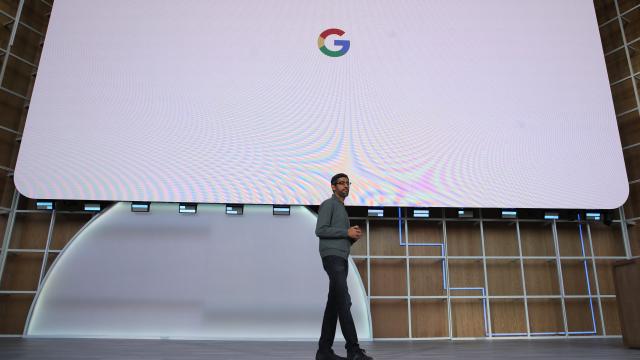While billboards go up in Silicon Valley calling for the break up of big tech, executives at Google and Facebook continue to argue that the massive scale of their companies is a key asset in the emerging tech cold war between the United States and China.
In an interview this week with CNN, Google CEO Sundar Pichai attempted to turn antitrust questions around by pointing to what they say is the silver lining of size: Big beats China. In the face of an intensifying push for antitrust action, the argument has been called tech’s version of “too big to fail”.
“Scale does offer many benefits, it’s important to understand that,” Google CEO Sundar Pichai said.
“As a company, we sometimes invest five, 10 years ahead without necessarily worrying about short term profits. If you think about how technology leadership contributes to leadership on a global economic scale. Big companies are what are investing in AI the most. There are many benefits to taking a long term view which big companies are able to do.”
Pichai, who did allow that scrutiny and competition were ultimately good things, made points that echoed arguments made by Facebook CEO Mark Zuckerberg who made his point a lot more frankly.
“I think you have this question from a policy perspective, which is, ‘Do we want American companies to be exporting across the world?’” Zuckerberg said last year. “I think that the alternative, frankly, is going to be the Chinese companies.”
Pichai never outright said the word “China”, but he didn’t have to. China’s rising tech industry and increasingly tense relationship with the United States
“There are many countries around the world which aspire to be the next Silicon Valley. And they are supporting their companies, too,” Pichai said to CNN. “So we have to balance both. This doesn’t mean you don’t scrutinise large companies. But you have to balance it with the fact that you want big, successful companies as well.”
This has been one of Silicon Valley’s safest fallback arguments since antitrust sentiment began gaining steam in the United States. But the history of American industry offers a serious counterweight.
Columbia Law School professor Tim Wu spent much of 2018 outlining the case for antitrust action. He wrote a book on the subject, The Curse of Bigness: Antitrust in the New Gilded Age, and appeared all over media to make his argument. In an op-ed for The New York Times, Wu called back to the heated Japanese-American tech competition of the 1980s.
IBM faced an unprecedented international challenge in the mainframe market from Japan’s NEC while Sony, Panasonic and Toshiba made giant leaps forward. The companies had the strong support of the Japanese government.
Wu laid out what happened next:
Had the United States followed the Zuckerberg logic, we would have protected and promoted IBM, AT&T and other American tech giants — the national champions of the 1970s. Instead, the federal government accused the main American tech firms of throttling competition. IBM was subjected to a devastating, 13-year-long antitrust investigation and trial, and the Justice Department broke AT&T into eight pieces in 1984. And indeed, the effect was to weaken some of America’s most powerful tech firms at a key moment of competition with a foreign power.
But something else happened as well. With IBM and AT&T under constant scrutiny, a whole series of industries and companies were born without fear of being squashed by a monopoly. The American software industry, freed from IBM, came to life, yielding companies like Microsoft, Sun and Lotus. Personal computers from Apple and other companies became popular, and after the breakup of AT&T, companies like CompuServe and America Online rushed into online networking, eventually yielding what we now call the “internet economy”.
Silicon Valley’s argument, however, does resonate. The 1980s is not the 2010s and the relationship between China and the US today is significantly colder and even more complex than Japan and the US three decades ago.
American politicians have echoed some of big tech’s concerns about Chinese leadership.
Congress just opened what promises to be a lengthy antitrust investigation into big tech that barely talked about China.
“Concentration in the digital advertising market has pushed local journalism to the verge of extinction,” said Representative David Cicilline, a Rhode Island Democrat.
American lawmakers are planning more hearings, depositions, interviews and subpoenas over the next 18 months, according to The New York Times.
